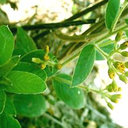Arctigenin Attenuates Ischemia/Reperfusion Induced Ventricular Arrhythmias by Decreasing Oxidative Stress in Rats.
Keywords
Abstract
OBJECTIVE
Arctigenin (ATG) has been shown to possess anti-inflammatory, immunemodulatory, anti-viral, anti-microbial, anti-carcinogenic, vasodilatory and anti-platelet aggregation properties. However, the protective role of ATG in prevention of arrhythmias induced by myocardial ischemia/reperfusion is unknown. The aim of this study was to investigate the anti-arrhythmia effect of ATG in an ischemia/reperfusion injured rat heart model and explore the related mechanisms.
METHODS
Rats were randomly exposed to sham operation, myocardial ischemia/ reperfusion (MI/R) alone, ATG+ MI/R, pretreated with ATG in low (12.5 mg/kg/day), medium (50 mg/kg/day) and high dose (200 mg/kg/day), respectively. Ventricular arrhythmias were assessed. The activity of superoxide dismutase (SOD), glutathione peroxidase (GSH-Px) and the level of malondialdehyde (MDA) in myocardial tissue were determined by chemical analysis.
RESULTS
Compared to MI/R, rats pretreated with ATG in doses of 50 mg/kg/day and 200 mg/kg/day showed significantly reduced incidence and duration of ventricular fibrillation, ventricular tachycardia and ventricular ectopic beat (VEB), and decreased the arrhythmia score during the 30-min ischemia. Incidence and duration of ventricular tachycardia, infarction size and arrhythmia scores in these groups were significantly decreased during the 120-min reperfusion. No ventricular fibrillation occurred during the period of reperfusion. Rats pretreated with ATG in doses of 50 mg/kg/day and 200 mg/kg/ day markedly enhanced the activities of antioxidant enzymes SOD and GSH-Px, reduced the level of MDA. No differences were observed between the group pretreated with a low dose of ATG and the sham group. Administration of ATG significantly increased the expression of antioxidant stress protein Nrf2, Trx1 and Nox1.
CONCLUSIONS
Our data suggested that ATG plays anti-arrhythmia role in ischemia/reperfusion injury, which is probably associated with attenuating oxidative stress by Nrf2 signaling pathway.



